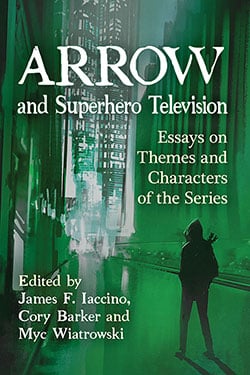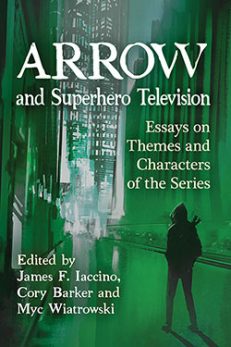Arrow and Superhero Television
Essays on Themes and Characters of the Series
$19.99
In stock
About the Book
This collection of new essays focuses on The CW network’s hit television series Arrow—based on DC Comic’s Green Arrow—and its spin-offs The Flash, DC’s Legends of Tomorrow and Supergirl. Comic book adaptations have been big business for film studios since Superman (1978) and in recent years have dominated at the box office—five of the 11 highest grossing films of 2016 were adapted from comics. Superheroes have battled across the small screen for considerably longer, beginning with The Adventures of Superman (1952–1958), though with mixed results. The contributors explore the reasons behind Arrow’s success, its representation of bodies, its portrayal of women, its shifting political ideologies, and audience reception and influence on storylines.
About the Author(s)
Bibliographic Details
Edited by James F. Iaccino, Cory Barker and Myc Wiatrowski
Format: softcover (6 x 9)
Pages: 243
Bibliographic Info: notes, bibliography, filmography, index
Copyright Date: 2017
pISBN: 978-0-7864-9787-4
eISBN: 978-1-4766-2965-0
Imprint: McFarland
Table of Contents
Acknowledgments v
Introduction 1
James F. Iaccino, Cory Barker and Myc Wiatrowski
Part One: Theoretical Approaches to Understanding Arrow
“I must become something else”: The Evolution of The CW’s Arrow (Lisa K. Perdigao) 11
Reading the Body, Deciphering the Text: Arrow’s Multiliteracies, Superheroics and Merging Multimodalities (Perry Dantzler) 27
The Arrow and His Villainous Counterparts: An Examination of Their Journeys Toward Psychic Transformation (James F. Iaccino) 46
Part Two: Muscles, Scars and Tattoos
Working Out as Creative Labor, or the Building of the Male Superhero’s Body (Juan Llamas-Rodriguez) 61
Twenty Percent of His Body: Scar Tissue, Masculinity and Identity in Arrow (Evan Hayles Gledhill) 78
Beyond Wounds and Words: The Rhetoric of Scarred Embodiment in Arrow (Sara K. Howe) 95
The Mark of Cain: Bodies, Belonging and the Bratva (John Carter McKnight) 111
Part Three: Sexism and Empowerment in Arrow
Simians, Cyborgs and Smoak: Felicity’s Gendered Roles (Ashley Lynn Carlson) 124
Sexism, Heroism and Morality in The CW’s Arrow and DC Comics’ Green Arrow (Katherine E. Whaley and Justin Wigard) 136
Part Four: Politics and Diversity in Arrow
“You have failed this city”: Arrow, Left-Wing Vigilantism and the Modern Day Robin Hood (Antonio Pineda and Jesu´s Jime´nez-Varea) 150
“What, O.J. and Charles Manson weren’t available?” DC Comics, The CW’s Arrow and the Quest for Racial Diversity (Rodney A. Thomas, Jr.) 167
Part Five: The Influence of Arrow’s Fandom World and Fandom Building
Extending the Universe of Arrow in Arrow 2.5 (Me´lanie Bourdaa and Bertha Chin) 177
When Fans Know Best: Oliciters Right the Ship (Tanya R. Cochran and Meghan K. Winchell) 191
Filmography 209
Bibliography 215
About the Contributors 227
Index 231
Book Reviews & Awards
- “Insightful, thorough, and thought-provoking. This fascinating book offers a unique lens for viewers to both learn about and more deeply enjoy the superhero genre in television and movies.”—Ryan M. Niemiec, Psy.D., author of Positive Psychology at the Movies and Movies and Mental Illness
- “Debuting on The CW in 2012, Arrow was meant to fill the void left by the end of Smallville. The series has been fairly successful throughout its broadcast run which is why it is surprising that it has taken so long for someone to undertake a scholarly analysis of the series. The new book Arrow and Superhero Television: Essays on Themes and Characters of the Series, edited by James F. Iaccino, Cory Barker and Myc Wiatrowski, serves to do just that and is a welcome addition to McFarland’s popular culture listings. Essays in this collection explore a wide variety of the themes running throughout the series–such as the dance between liberal and conservative politics and the focus on objectification of the male body–as well as noting how fan interest and activism have shaped the course of the series’ storylines. I highly recommend the book for anyone interested in Arrow and the superhero genre.”—Sherry Ginn, editor of Marvel’s Black Widow from Spy to Superhero





